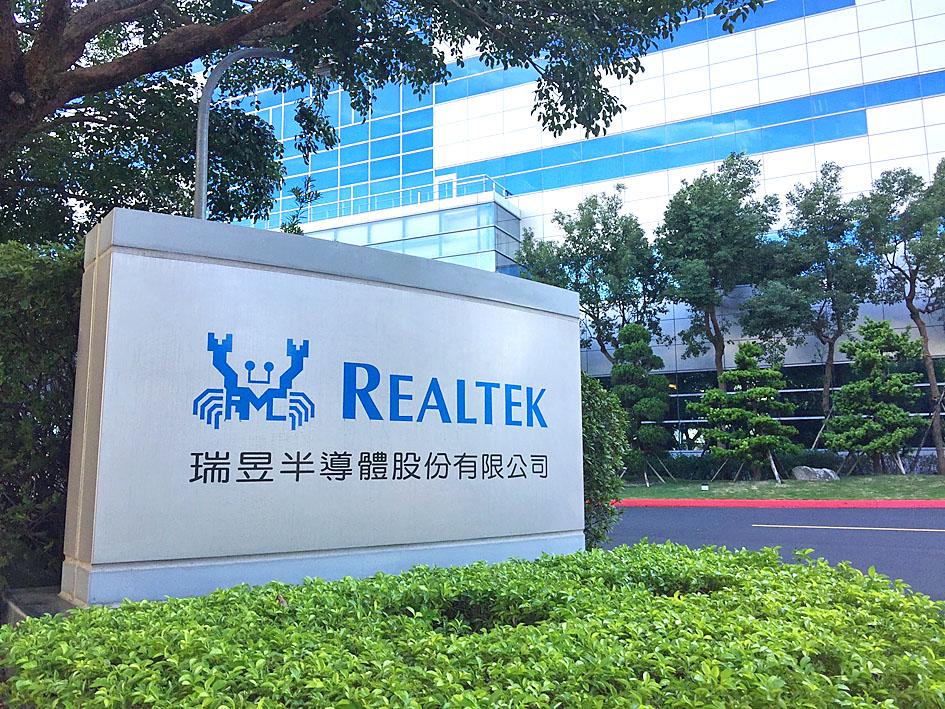Realtek Semiconductor Corp (瑞昱半導體) yesterday posted record high net profit for last year after gross margin climbed to surpass 50 percent, supported by strong demand for its chips across the board, from Ethernet switches to Wi-Fi chips, as the work-from-home and online-learning trends stimulated broad infrastructure upgrades.
Net profit soared 91.7 percent to NT$16.85 billion (US$605.29 million) last year, compared with NT$8.79 billion in 2020. That translated to earnings per share of NT$33, up from NT$17.24.
Gross margin jumped to 50.4 percent last year from 42.8 percent in 2020, as Realtek opted to supply higher-margin products amid ongoing semiconductor supply constraints.

Photo: Grace Hung, Taipei Times
Revenue swelled 35.7 percent to NT$105.5 billion last year from NT$77.76 billion in 2020.
Realtek spokesman Huang Yee-wei (黃依瑋) told investors that the company is “seeing positive demand extend into the first half of 2022 at least, from the second half of 2021... Ethernet products are showing strong growth momentum in 2022.”
With people returning to the office, enterprise demand for commercial PCs is continuing to improve, Huang said.
Commercial PCs on average are equipped with higher specification components, such as better audio codecs and smart amplifiers, which are good revenue drivers, he said.
Broader 5G deployment worldwide and infrastructure upgrades are also stimulating demand for networking chips, including Wi-Fi 6, Bluetooth and Ethernet controllers, he added.
“Realtek is not a 5G chip supplier, but the company’s [networking] chips are complementary to 5G network deployment,” Huang said.
The company expects network switch controllers to be another growth driver amid continuing network upgrades worldwide and Realtek is confident about gaining market share, he said.
The global network switch market is expected to expand at a compound rate of 10 percent in the next three to five years, he added.
The company expects rising demand for Wi-Fi 6 chips to also boost growth, Huang said.
This year, about 50 percent to 60 percent of PCs would be equipped with Wi-Fi 6 chips, he said.
Wi-Fi 6 chips deliver a 50 percent price premium compared with the previous generation of Wi-Fi 5 chips, he added.
Realtek also expects strong growth in demand for its new Ethernet chips used in vehicles, as it benefits from the trend of vehicle electrification, Huang said.
As customers are adopting the latest generation of chips, Realtek expects gross margin to hover at about 50 percent for the foreseeable future, he said.
With demand for chips expected to continue to outpace supply, Realtek said that it has secured 8-inch wafers from new foundry partners to add to its supply this year.

Sweeping policy changes under US Secretary of Health and Human Services Robert F. Kennedy Jr are having a chilling effect on vaccine makers as anti-vaccine rhetoric has turned into concrete changes in inoculation schedules and recommendations, investors and executives said. The administration of US President Donald Trump has in the past year upended vaccine recommendations, with the country last month ending its longstanding guidance that all children receive inoculations against flu, hepatitis A and other diseases. The unprecedented changes have led to diminished vaccine usage, hurt the investment case for some biotechs, and created a drag that would likely dent revenues and

Macronix International Co (旺宏), the world’s biggest NOR flash memory supplier, yesterday said it would spend NT$22 billion (US$699.1 million) on capacity expansion this year to increase its production of mid-to-low-density memory chips as the world’s major memorychip suppliers are phasing out the market. The company said its planned capital expenditures are about 11 times higher than the NT$1.8 billion it spent on new facilities and equipment last year. A majority of this year’s outlay would be allocated to step up capacity of multi-level cell (MLC) NAND flash memory chips, which are used in embedded multimedia cards (eMMC), a managed

CULPRITS: Factors that affected the slip included falling global crude oil prices, wait-and-see consumer attitudes due to US tariffs and a different Lunar New Year holiday schedule Taiwan’s retail sales ended a nine-year growth streak last year, slipping 0.2 percent from a year earlier as uncertainty over US tariff policies affected demand for durable goods, data released on Friday by the Ministry of Economic Affairs showed. Last year’s retail sales totaled NT$4.84 trillion (US$153.27 billion), down about NT$9.5 billion, or 0.2 percent, from 2024. Despite the decline, the figure was still the second-highest annual sales total on record. Ministry statistics department deputy head Chen Yu-fang (陳玉芳) said sales of cars, motorcycles and related products, which accounted for 17.4 percent of total retail rales last year, fell NT$68.1 billion, or

In the wake of strong global demand for AI applications, Taiwan’s export-oriented economy accelerated with the composite index of economic indicators flashing the first “red” light in December for one year, indicating the economy is in booming mode, the National Development Council (NDC) said yesterday. Moreover, the index of leading indicators, which gauges the potential state of the economy over the next six months, also moved higher in December amid growing optimism over the outlook, the NDC said. In December, the index of economic indicators rose one point from a month earlier to 38, at the lower end of the “red” light.